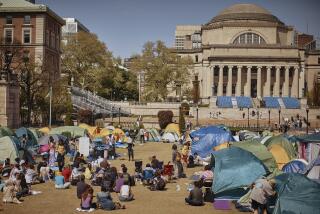Controversial professor wins wrongful-termination lawsuit
- Share via
BOULDER, COLO. — The University of Colorado professor who likened 9/11 victims to a Nazi leader was fired in retaliation for his controversial remarks, a Denver jury ruled Thursday.
Jurors in the wrongful-termination lawsuit filed by Ward L. Churchill agreed with the embattled professor’s contention that he was the victim of a “howling mob,” not the perpetrator of academic misconduct.
However, they awarded him only $1 in damages, an amount Churchill dismissed after the verdict as unimportant.
“What’s next for me? Reinstatement, of course,” Churchill said at a televised news conference outside the courtroom. “I didn’t ask for money. I asked for justice.”
It’s up to Chief Denver District Judge Larry Naves to decide whether to return Churchill, 61, to his $96,392-per-year job as a professor of ethnic studies at the Boulder campus. The judge also will determine whether the university must pay his legal fees.
Churchill’s attorney, David Lane, said the verdict represented a victory “for the 1st Amendment and academic freedom.”
“We’ve never argued the fact that [the 9/11 essay] is what started this ball rolling,” said Ken McConnellogue, spokesman for the University of Colorado system.
But Churchill was fired for academic misconduct uncovered in the aftermath of the essay’s publication, he said.
“We’re certainly disappointed in the decision, but it doesn’t change the fact that 20 of his peers found he engaged in plagiarism and academic dishonesty.”
McConnellogue said the university has not decided whether it will appeal.
Churchill, a tenured professor known for his blunt manner, was fired in 2007 -- two years after the firestorm that erupted over an essay he penned soon after the Sept. 11, 2001, terrorist attacks.
The paper, “Some People Push Back: On the Justice of Roosting Chickens,” attributed the attacks to U.S. foreign policy and called victims in the World Trade Center “little Eichmanns,” a reference to Holocaust architect Adolf Eichmann.
The contents of the essay didn’t become widely known until 2005, when a campus newspaper at Hamilton College in upstate New York, where Churchill had been scheduled to speak, dug up the essay and printed a story about it.
The essay quickly placed the professor and the University of Colorado at the center of a maelstrom. Many, including then-Colorado Gov. Bill Owens, called for his ouster.
University officials concluded that free-speech protections prevented them from firing Churchill for the Sept. 11 essay. However, as complaints about Churchill’s academic work surfaced, the school launched an investigation and fired him after three committees of faculty members from Colorado and other universities concluded that Churchill had committed plagiarism, fabrication and research misconduct in his writings on American Indian history.
During the four-week trial, Churchill took the stand to defend his research and reiterate his belief that the terrorist attacks were “perfectly predictable,” according to the Associated Press. The only surprise was that they took so long to occur, he said.
In comparing the 9/11 victims to Eichmann, Churchill said he intended to make the point that “if you make it a practice of killing other people’s babies for personal gain . . . eventually they’re going to give you a taste of the same thing.”
More to Read
Sign up for Essential California
The most important California stories and recommendations in your inbox every morning.
You may occasionally receive promotional content from the Los Angeles Times.










